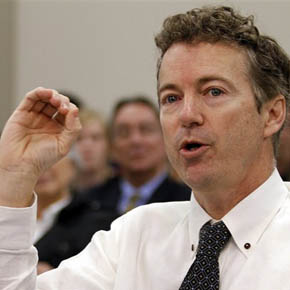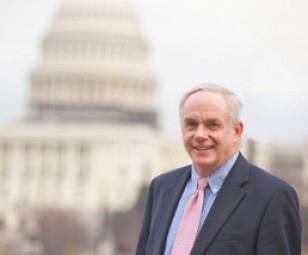
President Obama, shown here meeting with newly sworn in U.S. citizens Monday, March 25, is enjoying a brief respite from the budget battles with Republicans. Photo: AP
Bracing for a Summer Showdown
Members of Congress are away for the next two weeks, but before they left town they approved a law that will keep the federal government funded through the end of September. Passage of the funding measure avoided a government shutdown and includes the $85 billion worth of across-the-board spending cuts known as the budget sequester.
Republicans are celebrating. They finally got some of the spending cuts they’ve been demanding for months and are now heading home to claim victory to their conservative supporters. But they also may face some questions from angry voters concerned about the local impact of some of the sequester cuts such as those on military bases and small airports where the cuts will begin to have an impact soon.
Both sides in Washington’s budget battle can now claim victories. President Barack Obama and the Democrats won the battle for higher taxes on the rich back in January. Republicans staged their comeback in the battle over the sequester cuts and now present themselves as a major obstacle to any hope the president has of boosting government spending in the near future on priorities like early childhood education or infrastructure improvements.
Another Battle on the Horizon
The next major skirmish is likely to come in July or August and will again involve the need for Congress to raise the debt ceiling so that the government can pay its bills. House Republicans have said they will not approve another debt ceiling increase unless there’s an agreement to cut an equal amount in government spending. Democrats are warning they will not go along with more cuts unless Republicans agree to raise more revenue by raising taxes on the wealthy.
As with any battle over the debt limit, there is an element of economic risk here. If one side or the other overplays its hand in the debt limit skirmish, it could have an impact on world markets and set the stage for a political backlash for the party perceived to be at fault.
It’s too early to know which side has the upper hand heading into the next budget battle. Liberal Democrats are already disappointed that President Obama didn’t fight harder to prevent the sequester cuts from taking hold. Conservatives are happy they got their way in the sequester battle, but see it as only a small step in the larger struggle to balance the budget within the next 10 years. For now, the public probably welcomes the stand-down in the budget war, however temporary. But on whose side will they be when the war heats up in a few months?
Republican Rumblings
The surprise winner in the post-Obama re-election contest to see which Republican can garner the most national attention is Kentucky Senator Rand Paul. Paul narrowly won the CPAC (Conservative Political Action Conference) straw poll vote for president over Florida Senator Marco Rubio. Paul also staged a 13-hour filibuster, drawing attention to the Obama administration’s drone policy, and has emerged as one of the few Republicans with a national profile who can appeal to both Tea Party types and mainstream conservatives.

Senator Rand Paul, pictured here in during a speech last month, was a surprise highlight at a recent gathering of Republican Party conservatives. Photo: AP
Republicans are clearly looking for new, younger alternatives on the national scene to their two most recent presidential nominees—Mitt Romney last year and John McCain in 2008. Both Paul and Rubio fit the bill in terms of appealing to young conservatives. The question is which one is better positioned to broaden the appeal of the Republican Party beyond conservative activists and make the party truly competitive in the next presidential election contest.
There is a lot of time between now and 2015 when the next group of presidential candidates begins to get ready for 2016. And don’t forget New Jersey Governor Chris Christie, who probably has more potential for appeal to centrists than all of the other Republican contenders combined. Christie was not invited to speak at the recent CPAC meeting of conservatives, but if anything, that probably helped his standing with political moderates who may be in a mood to shop for a Republican alternative in the next presidential election.
Supreme Court Takes on Gay Marriage
The nine U.S. Supreme Court justices take on two cases related to gay marriage this week. First, the court is being asked to consider whether California’s ban on same sex marriage, known as Proposition 8, is constitutional. If the court were to rule that states may not enact laws that bar same sex marriage, traditional marriage proponents believe the flood gates would open around the country on efforts to ensure gays and lesbians have the right to marry. However, the court could confine itself to a smaller bore ruling that might only pertain to California, so we are a way off from knowing just how sweeping a ruling might come out of the divided court.

Sandy Stier, left, and Kris Perry of Berkeley, California visit the tourist sites in Washington Monday, March 25, a day before their gay marriage case is heard by the U.S. Supreme Court. Photo: AP
The second case involves a challenge to the 1996 federal law known as the Defense of Marriage Act that defines marriage as between a man and a woman. This law bars federal recognition of state laws that allow gay marriage.
The cases come before the court at a time when public opinion seems to be shifting in favor of legalizing gay marriage. A recent Washington Post-ABC News poll found support for allowing same sex marriage has jumped to 58 percent, with 36 percent opposed. Back in 2006, those numbers in the same poll were reversed, a remarkable shift in just the past few years.
It will be interesting to see to what degree the Supreme Court either reflects the recent shifts in public opinion or rejects it. The traditional conservative-liberal split on the high court will likely come into play here.
Four of the justices tend to be reliably conservative, while four others tend to come down on the liberal side of arguments. The swing vote is usually Justice Anthony Kennedy and he could be again in the two cases this week on gay marriage. The high court will issue rulings in both cases sometime before its term concludes at the end of June.


2 responses to “Budget War Pause”
I always enjoy the articles on VOA’s site. They are consistently well written and informative, and steer clear of the bickering that characterizes so much of the “news” that comes out of Washington.
This article was concise and cleanly written. Bravo!
[…] Voice of America (blog) […]